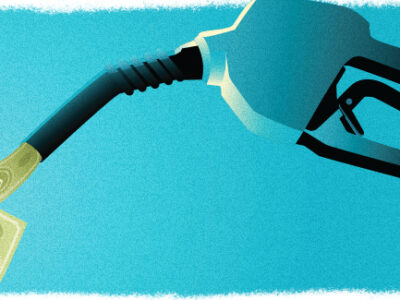It’s a dangerous world today. Remorseless men murder their wives and lovers. Terrorists want to bomb humankind back to the seventh century. And now, gas station owners with blood as cold as a reptile are conspiring to charge you outrageous sums for gasoline.
We had a preview of these diabolical machinations after Hurricane Katrina. The price of gas at the pump reached record highs then, but a few vendors (descendants of Attila the Hun, surely) went straight for our financial jugulars by posting prices above—gasp!—$6.00 per gallon (not as high as many Europeans pay, but a pain in the pocketbook nonetheless).
But wait, the cavalry is riding to the rescue! Our beloved U.S. Congress will save us from those dastardly villains with new “anti-price-gouging” rules. Never again will gas station owners—those Darth Vaders of commerce—insult our dignity or violate our public standards of decency by charging “too much” for a gallon of gasoline. If they do, they will be fined some colossal sum of money that will make the penalty for grand theft auto look like penny-ante stuff.
I’m sure we’re all immensely grateful for Congress’ brave heroes rallying to protect us, but since we Americans allow even the “Boston stranglers” in our midst to have their day in court, please indulge me while I offer a modest defense of gasoline price gougers.
If somebody wants to ask six dollars per gallon when his competitors are asking for three, whose rights are being violated? After all, he isn’t kidnapping people at gunpoint and forcing them to buy his gasoline. We can heed Ronald Reagan’s advice to “Just say ‘no.’” I don’t know about you, but if I saw one gas station advertising $6.00 per gallon while the guy on the other corner asks $3.00, then ceteris paribus (this is the economist’s ever-present qualifier, meaning “everything else being equal”) I’d choose $3.00.
But what if other things are not equal? A story I tell in economics classes is pertinent here. A man walks into a store, buys a dozen eggs, and as he is paying the clerk, says, “How dare you charge $1.50 per dozen when across the street they’re advertising them for 75 cents!” “Well, why aren’t you buying your eggs over there?” asks the clerk. “Because they’re out of them,” replies the customer. Similarly, if a gas station posting a $3.00 price has run out of gasoline, then some of us might figure it’s worth it to buy some for $6.00.
Okay, but what if both stations have gas available? Is there any reason for one station to charge far more than another? Consider this scenario: another hurricane triggers panic buying of gasoline. Most people prefer to pay $3.00 instead of $6.00, correct? That would imply longer lines at the lower-priced station, while there might be no line at all at the more expensive station. Someone with an important date or appointment, but having a car that is almost out of gas, might prefer to buy a couple of gallons for $6.00 at a gas station with no lines than wait in line to fill up for $3.00. And what about a doctor or parent responding to a personal emergency who has to fill up the tank for a 300-mile trip where every minute is critical? Without a “gouger” driving the masses away with stinky high prices, the customer with an urgent need for gas could lose precious time waiting in line. In such cases, customers receive a benefit that was only available because of “greedy, price-gouging” vendors.
Now put yourself in the gas station owner’s shoes. Would you deliberately drive away most of your potential customers by habitually posting prices far above those of your competitors? I doubt it. But what if your 25,000-gallon reservoir is down to its last 200 gallons and the tanker bringing your next load won’t arrive until tomorrow? If you hold prices at the going rate, your reserves would be exhausted within an hour, and you would have to close early. Your employees, usually workers who need to earn income, would have to go home early, too. Why hurt your employees? And would you want your gas station to be known as “the one that runs out of gas in a pinch”?
When politicians threaten to punish individuals for offering their property for sale at “unacceptable” prices, I hear echoes of the command economies that bankrupted themselves and their people in the last century. Communist governments punished individuals for selling essentials like milk to mothers of babies at above the state-decreed price, even when the government stores had no milk to sell. Are “economic crimes against the state” coming to the United States of America? Personally, I’d rather take my chances with “price gougers.”



